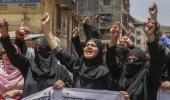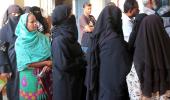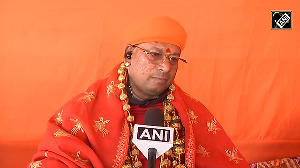The All India Muslim Personal Law Board on Sunday asserted that the Supreme Court verdict on maintenance to Muslim women was against Islamic law and authorised its president to explore all possible measures to ensure that this decision is overturned.

The board also decided to challenge in the Uttarakhand high court the Uniform Civil Code brought in the state.
After a meeting of its working committee in New Delhi, the board adopted a resolution which stated that the recent judgment of the Supreme Court on the maintenance of Muslim divorcee women is "against the Islamic law (Shariah)".
The Muslim body's assertions came days after the Supreme Court ruled that a Muslim woman can seek maintenance from her husband under Section 125 of the CrPC and said the "religion neutral" provision is applicable to all married women irrespective of their religion.
A bench of justices BV Nagarathna and Augustine George Masih in a separate but concurring verdict said, "(a) Section 125 of the CrPC applies to all married women including Muslim married women. (b) Section 125 of the CrPC applies to all non-Muslim divorced women."
In a statement, issued after the meeting, the AIMPLB said, "The Board emphasised that the Holy Prophet had mentioned that amongst all permissible deeds the most abhorred is divorce in the sight of Allah, hence it is desirable to continue the marriage by applying all permissible measures to safeguard it and follow several guidelines mentioned in Holy Quran about it."
"However, if married life becomes difficult to maintain, then divorce was prescribed as a solution to mankind," it said.
The board observed that this judgment will create further problems for women who have successfully come out of their painful relationship, the statement said.
The AIMPLB authorised its president, Khalid Saifullah Rahmani, to initiate all possible measures "legal, constitutional and democratic"? to ensure that this decision by the Supreme Court is "rolled back", AIMPLB spokesperson SQR Ilyas said at a press conference here.
Five other resolutions, including one against the Uniform Civil Code, were also passed during the meeting of the working committee of the AIMPLB.
The board pointed out that according to Article 25, all religious entities have the right to practice their religion, which is a fundamental right enshrined in the Constitution, the statement said.
The AIMPLB also stated that in "our multi-religious and multi-cultural country, UCC is impractical and undesirable" and hence, any attempt to implement it is against the spirit of the nation and the rights ensured for minorities, according to the statement.
Therefore, the central or state governments should refrain from drafting UCC laws, it said.
The board further observed that the decision to implement UCC in Uttarakhand was wrong and unnecessary, and also against the constitutional safeguards given to the minorities.
Therefore, the board has decided to challenge the Uttrakhand UCC in the high court, and directed its legal committee to file a petition, the statement said.
It was also resolved at the meeting that the Waqf properties are a legacy created by the Muslims for specific charity purposes, and therefore, they alone should be entitled to be its sole beneficiary, it said.
The board strongly condemned any attempts of the governments to weaken or eradicate the Waqf law.
In a resolution, it was noted that the results of the parliamentary elections indicated that the people of the country have expressed their deep resentment towards the agenda based on hatred and malice.
"It is expected that the frenzy of mob lynching would end now. The government continues to fail in its obligations to provide security to the deprived and the marginalized Muslims and lower castes citizens of India," the statement said.
In another resolution, the board stressed the implementation of the Places of Worship Act.
"It is a matter of great concern as to how the lower courts are entertaining the new disputes related to the Gyanvapi masjid and Shahi Eidgah of Mathura. The Board observed that the Supreme Court while pronouncing its judgment on Babri masjid had clearly stated that the 'Places of Worship Act, 1991' has now closed all such doors," the statement said.
The board expects the Supreme Court will put an end to all the new disputes and cases, it said.
The AIMPLB also observed that the NDMC, while using the traffic issue as an excuse, tried to demolish the Sunehri Masjid in Delhi, although the court intervened and put a stay on the matter.
However, the Board expressed caution over Sunehri mosque and six other mosques in the Lutyens' Zone which are shortlisted and "likely to be targeted by the disturbing elements", according to the statement.
It was also resolved at the meeting that the Palestine crisis is a humanitarian problem as Israel has illegally occupied and displaced the citizens of Palestine and made them stateless.
"It has broken all records of cruelty and atrocities and is consistently promoting genocide and barbaric acts of violence on the innocent Palestinians," the board said in its statement.
The AIMPLB stressed that India has always stood by the Palestinian people, right from Mahatma Gandhi to Atal Bihari Vajpayee, and even after that.
The AIMPLB appealed to the Muslim World to exhibit genuine concern for the people of Palestine.










 © 2025
© 2025